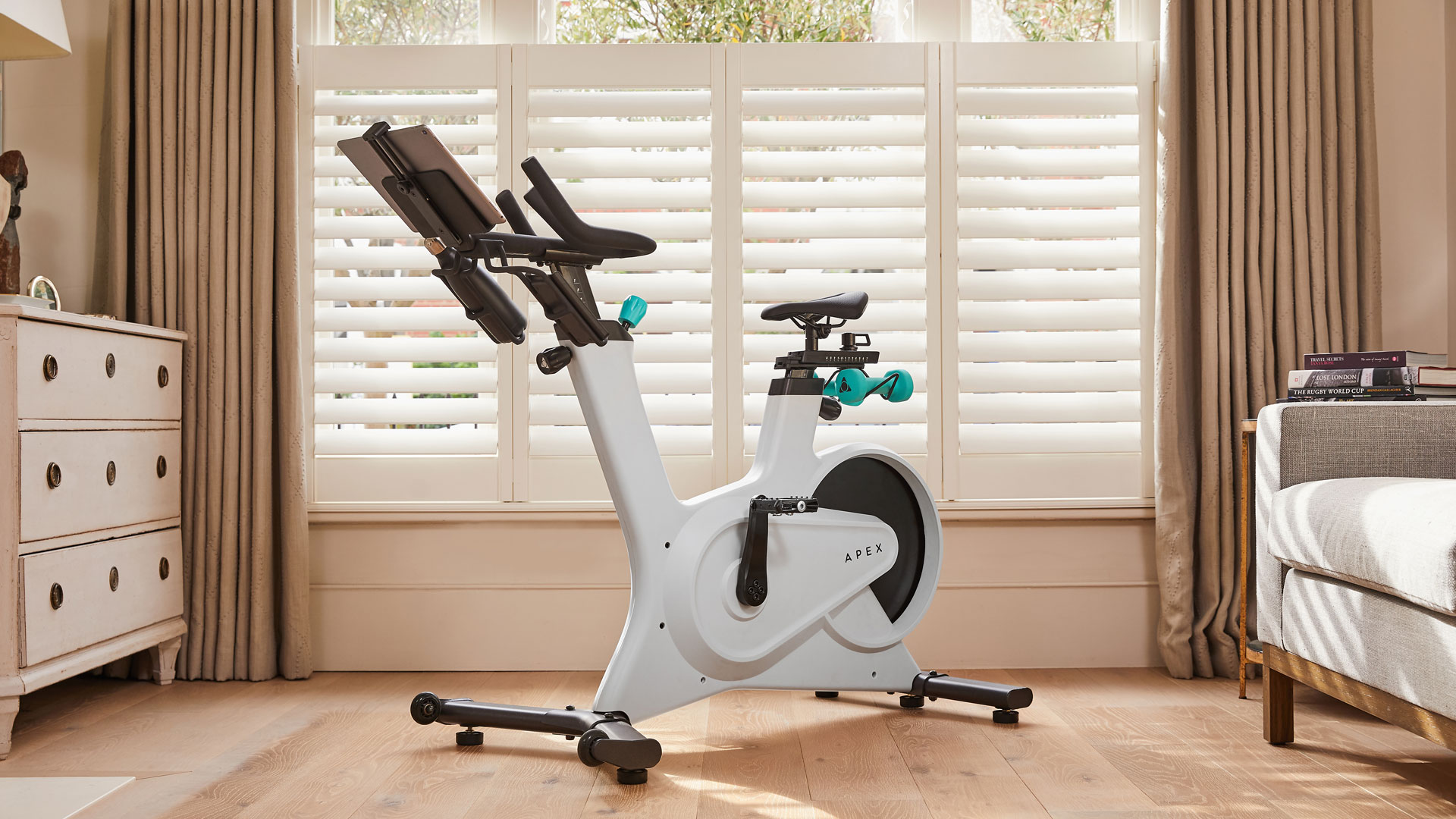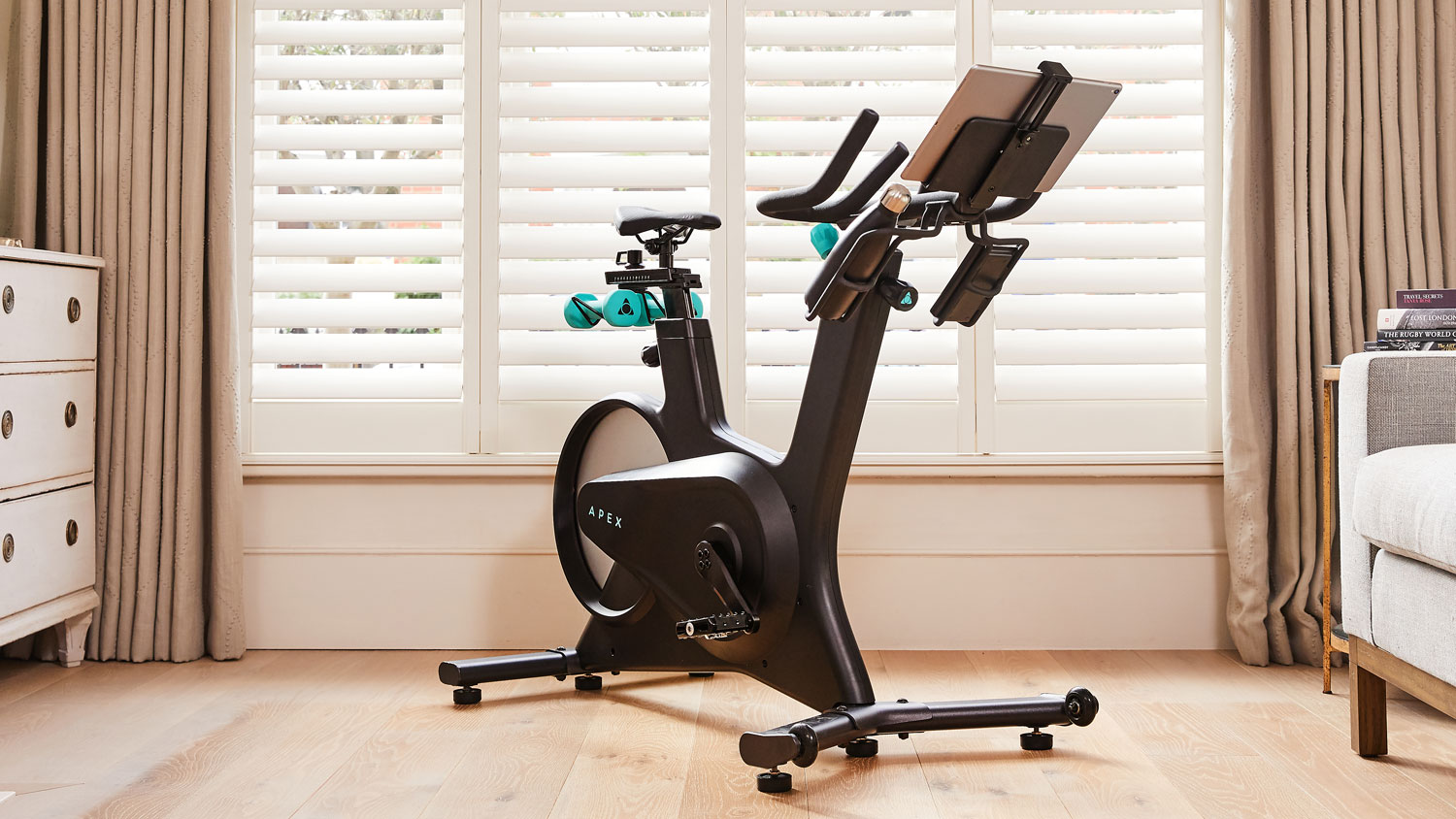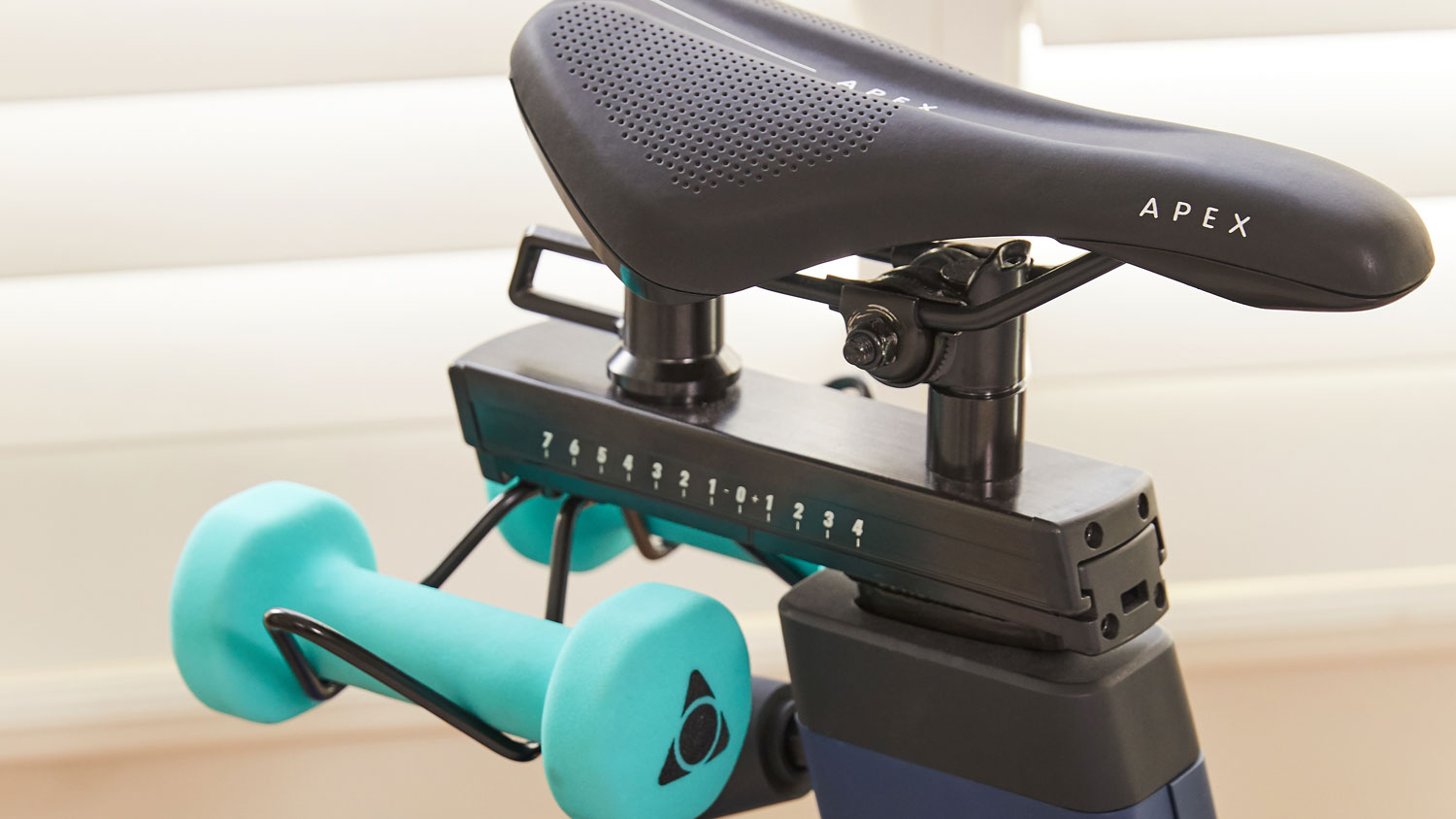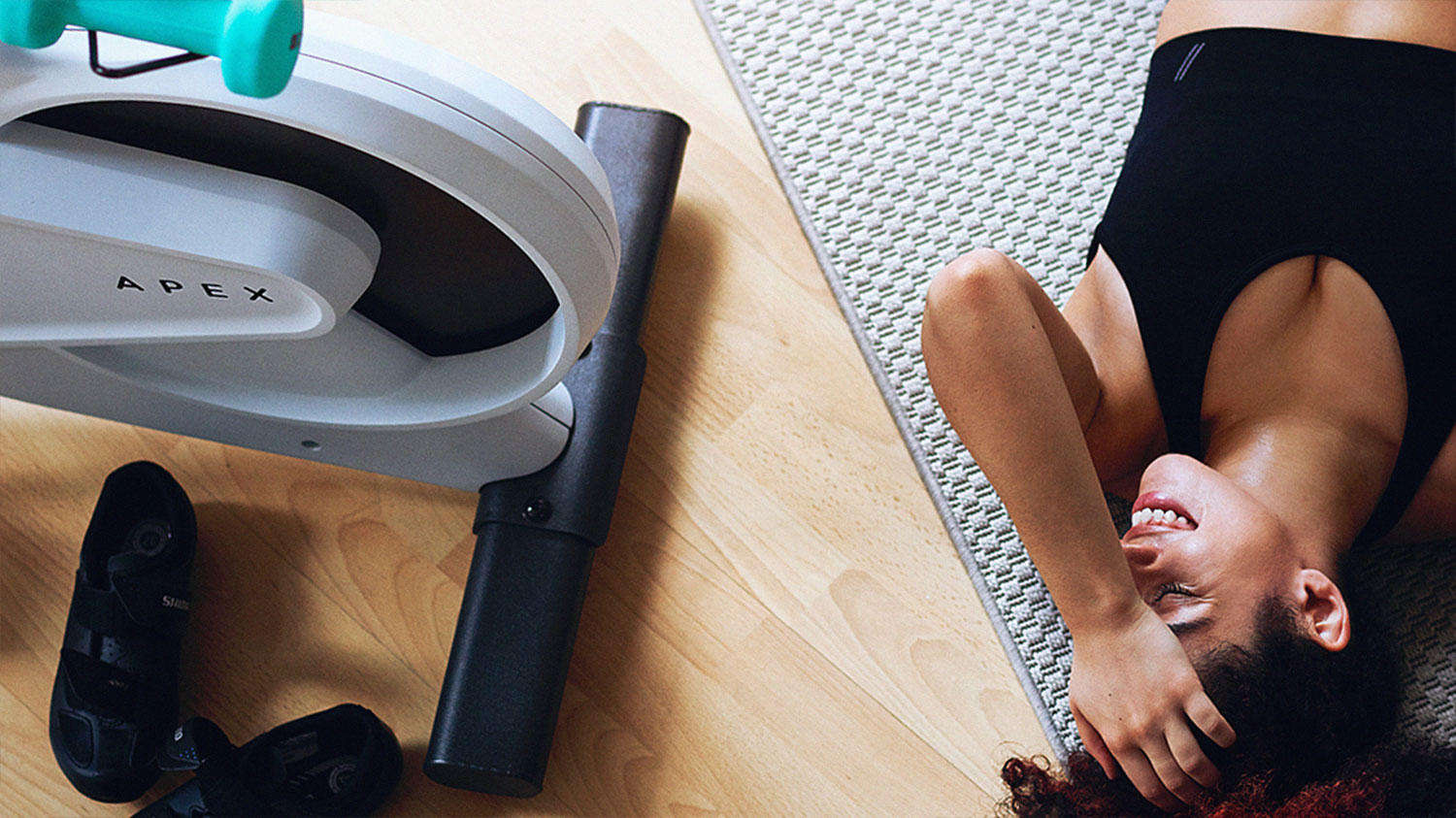Apex Bike review – The UK’s answer to Peloton is a spinning success
The Apex exercise bike is great value and well-made, with compelling classes and top notch trainers. Find out more in our review


The Apex bike is a wonderful piece of home exercise equipment that proves a worthy alternative for those who find Peloton just a tad expensive.
-
+
Modern and stylish design
-
+
Well made and easy to set up
-
+
Great range of classes and cool instructors
-
-
Handlebars are a little wobbly
-
-
Weights are an additional cost
-
-
Only works with iOS devices
Why you can trust T3
Welcome to T3's Apex Bike review. For most of us, the past year has been one we’ll be glad to see the back of. But not everyone will remember it resentfully. The makers of home gym and exercise equipment, for instance, have had one heck of a year.
With gyms and spin studios closed longer than they were open, the tribes of gym bunnies that would be frequenting these places have been foaming at the mouth to get their hands on the best exercise bikes, rowing machines and treadmills. Anything to give them that much-needed endorphin fix while isolating at home. And while our Peloton Bike+ review makes a strong case for submitting to the biggest fitness brand in the world right now, that price is going to be a bit much for many.
Enter Apex – the UK’s answer to a connected spin studio-style bike. Launched in the midst of the pandemic last summer, it answers the prayers of those gagging to get back in the saddle and enjoy some instructor-led classes, albeit virtually and without an extortionate price tag.
Having a more accessible price is always a good thing, but it begs the question: can Apex still deliver a compelling connected spin experience at home to match up to its rivals? Let’s find out.
Apex Bike review – Price and availability
The Apex Bike was launched in July 2020 and is available to buy right now directly from Apex for £1,200 - that’s £550 less than Peloton’s cheapest Bike option. It’s available in black, light grey, dark blue and “Nude” colourways, and if you want the dumbbells for weights classes, then you’ll have to pay an extra £25.
To access the virtual spin classes, the bike connects to the Apex Rides app on a phone or tablet. This gives you unlimited access for up to six people in your household. However, these classes come at an additional cost of £29.99 per month, which you can cancel at any time. That might sound pricey, but by today’s standards, it’s not so bad, considering how smart it is. Comparatively, Peloton’s cheapest bike costs £1,750 and then £39.99 per month on top of the all-access subscription.
The big downside with Apex, though, is that the app is only compatible with iOS devices, so if you’re an Android user, you’ll have to invest in an Apple iPad or iPhone to be able to enjoy the classes with the view of your live stats. It is also compatible with Apple TV, although you will still need an iOS device to mirror the screen.
Get all the latest news, reviews, deals and buying guides on gorgeous tech, home and active products from the T3 experts

Apex Bike review – Design
With a price tag that’s considerably less than most other smart bikes on the market, we weren’t quite sure what to expect before our Apex Bike arrived. Would it feel cheap? Would it feel like a knock-off Peloton? Thankfully, it was neither of those things. It’s certainly a very well-made piece of equipment that feels sturdy yet looks sleek.
Its solid frame is pretty heavy (at just over 41kg) but manoeuvring it around is still doable, even when attempting to move it on your own. We found it to be relatively compact, too, measuring 120x160x117cm. If, like us, you’re short on space, a neat trick we found was to remove the handlebars while not in use and rest them on the bike's frame. This will reduce its overall size considerably when you want to tuck it away out of sight.
The bike is made up of a racer-style saddle joined by narrow, multi-position “aero” handlebars, which not only make it very comfortable to ride - even for extended periods - but offer up a minimal and streamlined design that we can imagine will go well with the interiors of any home.

When it comes to the pedals, you’ll find a hybrid setup of a 50/50 SPD clip-in system for cleated shoes alongside a buckled strap for use with ordinary trainers - the latter of which isn’t ideal if you’re serious about your cycling. It sounds knit-picking, but we would have preferred it if Apex had used the more popular SPD-SL system (as seen on Peloton, for example).
The main drawback with purchasing an Apex Bike over the equivalent of a Peloton or Echelon is that there’s no built-in display. Instead, there’s a mount integrated into the handle bars where you can securely place an iPad or iPhone. As we mentioned before, the bike is not yet compatible with Android devices and there’s no word on when or if that will happen. This is very disappointing and considerably limits Apex’s customer base. Let’s hope they sort it out soon.
On the plus side, there is a pair of USB-A outputs at the front of the bike coupled with a water bottle holder and wireless charging cradle for your phone, which is a great touch.
Apex Bike review – Performance
Setting up the Apex Bike is pretty straightforward, and if you’re familiar with how to sort yourself out on a spin bike at the studio, then you’ll be fine here. Adjusting the saddle and handlebars to your own riding position is easy thanks to the pull-and-slide height adjustment knobs on both the saddle and bars, as well as a lever at the back to tweak the saddle fore/aft.
Resistance is supplied in the form of a 4kg flywheel at the rear. While this is considerably less weight than in most premium exercise bikes, we found that it’s more than sufficient, with the lowest setting providing lots of room for rapid spins and the highest being almost impossible to push. The dial which controls this resistance can be a little over-sensitive, though, but we do think this just takes some getting used to.
The only other niggle we have is that the handlebars can wobble a little, especially when you’re really going for it mid-class. We tried to tighten its surrounding nuts and bolts to fix this, but it didn’t seem to make a difference. This in no way impacted our workouts, though, which were mostly comfortable and smooth, with the bike generally performing very well.

Apex Bike review – Classes and app
The classes on the Apex platform are courtesy of top London spin studio Boom Cycle and are nothing short of exceptional. The instructors are experienced, edgy and fun. We love how they don’t take themselves too seriously and aren’t as corny as those you’ll find on, for example, Peloton. The production feels high quality, and it can be very immersive if you’re casting on an Apple TV. It doesn’t quite have the same effect on a 9-inch iPad or tiny iPhone, though, unfortunately.
The other great thing about these classes is that they show you your stats - RPM, power output (a calculation of your resistance combined with RPM) and your current resistance level - live on the screen during the recorded workout.
During the class, you’ll be guided through a five-minute warm-up before commencing the sweat-a-thon that is the main workout and then lead on to the cool down. Throughout, the instructor recommends the best level of resistance and cadence to match each track, and it works nicely - putting you right back in the saddle at a spin studio.
Speaking of music, there’s a good choice of genres on offer, which you can filter classes by before you attempt them. At the end of your spin sesh, you’ll be given a total power output that is converted to Apex points. These count towards your score on a members’ leaderboard, which is an effective motivator if you’re the competitive type. You can also share this data on your social or via Strava if you fancy showing off.

Apex Bike review – Verdict
With a stylish design and good, solid construction, the Apex Bike is a brilliant bit of kit for the price, complemented by some excellent virtual classes and top-notch instructors. It’s not perfect by any means, but if you’re thinking about buying a Peloton but don’t want to drop over £2,000 for the privilege, we’re confident the Apex Bike will be a more than worthy alternative.

Lee Bell is a freelance journalist and copywriter specialising in all things technology, be it smart home innovation, fit-tech and grooming gadgets. From national newspapers to specialist-interest titles, Lee has written for some of the world’s most respected publications during his 15 years as a tech writer. Nowadays, he lives in Manchester, where - if he's not bashing at a keyboard - you'll probably find him doing yoga, building something out of wood or digging in the garden.
